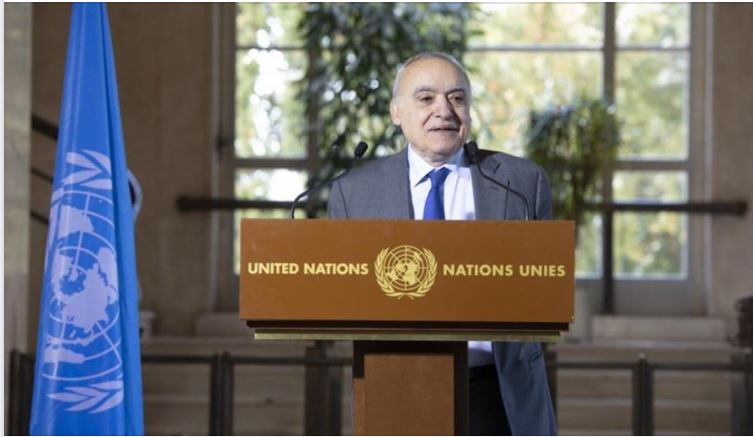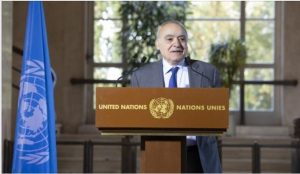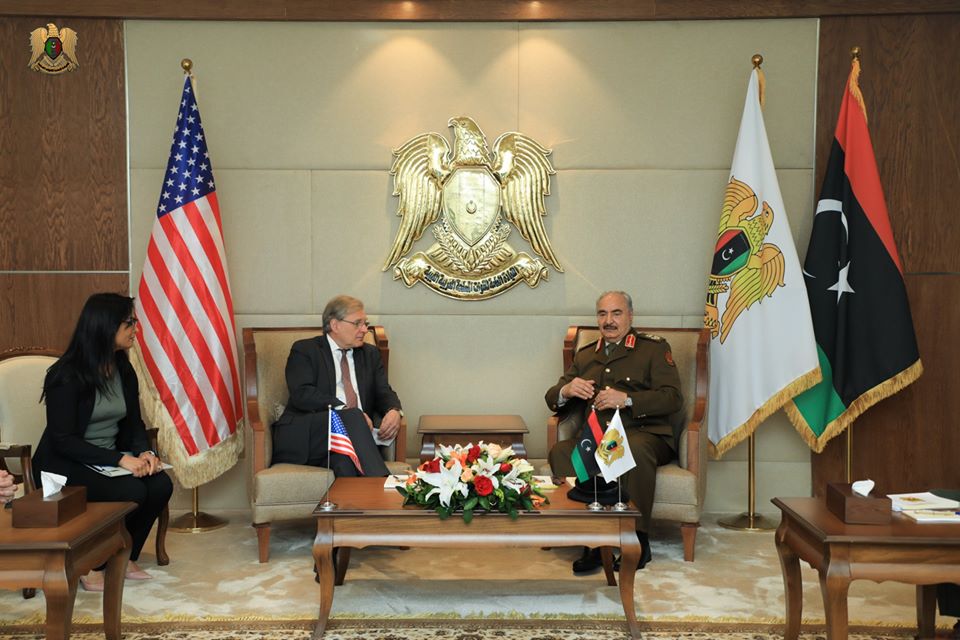By Sami Zaptia.
London, 18 February 2020:
UNSMIL head Ghassan Salame put a positive spin today at the end of the latest round of 5+5 Libya Military talks in Geneva despite continued attacks on Tripoli’s Mitiga airport yesterday and a first-time attack on Tripoli port today.
‘‘Well these past ten days we haven’t been meeting together. A few things happened that give us more hope in a gradual return to a more acceptable state of affairs in Libya. First, I would like to tell you that after we ended the first round of military talks here, we started the second round of the economic track in Cairo – with [the participation of] 28 financial and economic experts and officials from all over the country. The meeting went very well, and this economic track will continue with a new meeting in the first half of March, dealing with very sensitive issues in Libya such as the rebuilding of the country, such as the reconstruction of destroyed areas, such as development and of course the question of a better or fairer redistribution of state revenues.
The second event that took place since we met last was the adoption by the Security Council of Resolution 2510 (2020) that gave the Berlin Conference conclusion a stamp of legitimacy that was needed in order to convey a strong message that this effort of the Berlin process that took us many months to complete is adopted officially by the international community or at least by the United Nations Security Council.
We had also other events such as the decision of the European Union to think of helping with controlling the arms embargo at sea, and certainly we had in Munich, on the margins of the Munich Security Conference, a specific ministerial meeting, on the margins of the conference, that is the first follow-up meeting to the Berlin conference by those countries and organizations that had attended the Berlin conference, showing that the Berlin Conference was a point in time in a long process that will be maintained through this follow-up committee that met for the first time in Berlin and will meet every month. I think in the next month, it will be meeting in Rome.
So, while the situation on the ground remains a situation where the truce is very fragile, is often violated, where new attacks took place, even today, in the very [sea] port of Tripoli, where incidents take place left and right; while this situation remains on the ground, nobody has so far reneged on the principles of accepting the truce and the political process is trying to find a way to go forward. I’m happy to be back in Geneva to moderate the second round of the military talks. The two delegations arrived yesterday, and we started our meetings today at 10 o’clock [AM], and we hope to be able, in this second round, to come to some kind of consensus about what a lasting ceasefire could look like in Libya.
Media: You mentioned the announcement yesterday by the European Union on that new naval force. How do you assess that and how might that impact the talks this week because it seems that it is rather stationed in the zone next to one of the parties and not to the whole country?
Salame: Well, you know, Libya is more than three times France in terms of surface. And the arms embargo is being violated by air, by land and by sea, which means that monitoring the arms embargo needs a lot of efforts and a lot of cooperation for thousands of kilometers of coastline or land borders, not to mention the dozens of airports you have in Libya, in such a huge country, in fact it is almost a continent. And therefore whoever can help in monitoring the arms embargo is welcome in whatever part of Libya as long as he works in application of Resolution 2510 that calls for a better implementation of the arms embargo and whoever can help in implementing that resolution is most welcome, knowing in advance that nobody can take care of all this monitoring system that is needed in the air, on sea and on land.
Media: Can I get some clarification on exactly where we are in your process. You’re meeting again in proximity talks, I think. How close are you to a ceasefire? Do you need a ceasefire to be in place before your political talks next week? Are your political talks next week, are they the national conference you talked about originally in Ghadames? Could you explain that to us. And the big question, is your plan back on track?
Salame: The plan is very clear. It was exposed to the Security Council on July 29, and we are implementing it with a lot of determination and patience. I said then, that we first need an international umbrella, and for that we need some kind of international consensus. We spent the last four months of 2019 building this consensus and that led to the Berlin Conference on the 19th of January. We said that this conference cannot have any fruits unless it has a follow-up mechanism. The follow-up mechanism was put in place and the first meeting on the ministerial level took place two days ago in Munich, and the next one in March is going to take place in Rome. We also said that we need to push together in a contemporary way three tracks. The economic – we started on January 6, even before the Berlin Conference; the second meeting took place in Cairo last week, and the third meeting is going to take place in March. The military track, which is the second track, we started it two weeks ago in this very building – that was the first round and we are here in the second round – with the same mission, a long list of agenda items. I think that this commission has a lot to do – DDR, demilitarization, etc. but also the transformation of a truce into a lasting ceasefire. And the third track, which is the political one, that I hope will also be meeting in this very building on 26 March. So, my plan is not back on track; my plan has never left the track. It is being implemented with patience and determination despite the many obstacles. I better have a ceasefire in order to implement all the rest, but this is not a pre-condition.
Salame: (Translating a question) I was asked (in Arabic) about the major difficulties encountered by the military track, and I said that we have two categories of difficulties. The first category is the frequent violation of the truce, that the two parties had accepted on 12 January, and including today with the attack against the port of Tripoli. As long as these violations are frequent it is very, very hard to think of quiet negotiations between the two parties, or any one of the three tracks we are trying to push forward. And the second kind is the return of civilian life to the theatre of fighting. This needs to be organized in a very, very detailed way, and with an open mind where both sides make concessions. What kind of monitoring do you need? Who is going to do it on the ground? Are they going to be unarmed? What will happen to the other weapons? What will happen to non-regular fighters? What will happen to areas that are overbuilt, I mean very urbanized in the city of Tripoli, I mean who is going to be in charge of the police… these kinds of very specific questions that are part of the translation of a mere truce into a lasting ceasefire are the second category of difficulties we will need to address during this second round of military talks.
Media: At what point are the issues distinct from each other, meaning regarding what will be happening today and in the coming days, at what point are these talks distinct from next week? Should the talks this week fail, would they have an impact on next week’s negotiations?
Salame: There is no failure. There cannot be a failure this week. The reality is much more complex. The reality is that Libya is in a situation of instability since 2011. Those who think that one meeting of the economic track, that one meeting of the political track and one meeting of the military track can solve all the problems are naïve. We have a series of problems in the three tracks that are extremely complicated. So, we must give ourselves several weeks, and certainly several rounds in each of the tracks to reach a solution. The decision that was taken in Berlin was that for the three tracks – the economic and financial, the political and the military and security – to be held in a contemporary way. Not necessarily all on the same day at the same time, but approximately during the same period. That’s why we launched them all now. Why? Because the interest that is accorded to each of the tracks is different from one party to the next. Some would have liked us to begin talking about the ceasefire, others wanted us to start with a discussion about the formation of a united government, and others, still, wanted us to focus on the issue of the distribution of the oil revenues. What Berlin decided, and what we are trying to do with our modest means, is to launch the negotiations on the three tracks at the same time. It is tiring, I can tell you. Of course, making progress on one track would help achieve progress on another, but one is not dependent on the other. It means we can start discussing military issues and move forward a bit, and the political discussions could stop and then resume, etc. Things are moving rather well on the economic and financial file, I think. It is more difficult on the military track, and we will see about the political track when we start discussions next week.
Media: The Berlin Declaration… the countries that were present, and especially the countries that participated, or, well, that have direct influence on Libya, did these countries respect the agreement, this Berlin Declaration, and I talk especially about the countries that send arms and fighters. Did the fighters from Syria continue to arrive in Libya?
Salame: There have been violations. Since 19 January, there have been violations of the arms embargo and through the delivery of weapons and the arrival of foreign fighters. There have been violations. But were these violations some sort of new interference in the affairs of Libya, or were they the application of commitments taken before the Berlin Conference? I cannot tell you that at this point. What is certain is that there have been violations by States that had committed to not sending mercenaries or arms anymore. There were violations.
Salame: [Translating and answering a question in Arabic] He asked if there is a guarantee for the new resolution to be implemented, and I said that, as any observer of the UN Security Council knows very well, that not all resolutions taken by the Security Council are immediately implemented, but there are reasons to be hopeful here, first because the Libyans do want an end to this tragedy they have painted themselves into, but also that the Berlin Conference has produced a follow-up machinery that will push for the implementation of this resolution that basically translates into legal terms the conclusions of the Berlin conference.
Media: I was wondering if you could kindly update us where you are on your talks with the tribesmen on the oil blockade. And secondly, can you just tell us: two rooms or one today?
Salame: Well, we started with two rooms today, we started those two rooms, and I do not rule out the idea of having the one room, but so far, the two sides have seen that it is better that there is no direct interaction between them. I am after an agreement, I am not after a photo-op, so if I can get the agreement by any way, through one room, two rooms or three rooms – that is what I am looking for. The tribesmen have sent me recently their conditions, but I have to say that these conditions are quite general. In fact, most of them are dealt with in the economic track, and that is why we want the economic track to move forward in order to answer these questions. There are no specific conditions put by them in the letter I received from them.
Salame: [Translating and answering a question in Arabic] I was asked if any country is going to be invited to the political dialogue. I said that the external part of my process has been dealt with in Berlin, and yesterday in Munich, and next month in Rome. Now, it is the time for purely Libyan-Libyan negotiations. This was the case with the economic track in Cairo a week ago, where 28 experts and officials met in the absence of any country; this is the case with the military now, where we have five high-ranking officers from each side, and it’s purely Libyan-Libyan, and the political dialogue on the 26th will also be Libyan-Libyan. This does not prevent countries from following carefully these talks by being in Geneva, or elsewhere, but they will certainly be in the meeting room as such. He asked a second question if we invited people to the political dialogue. We are on the verge of inviting them officially in the next few hours.
Media: Lots of these themes we discussed the last time you were here. But the news yesterday was from the European Union announcing that it would end the Operation Sophia. I would like you to comment on that, if you could please, particularly because European powers, nine years ago, had a big role, particularly France and Britain had a big role, in bringing down the regime of Gaddafi, so can you tell us what is your response to the ending of this Operation Sophia?
Salame: This is half of the story, I was asked about the other half. The story is that Sophia has been terminated but is to be replaced by another project. The idea is now we have this insistence on the arms embargo – it is a big story in Libya. Why is it a big story? Because the country is already full of weapons, more than 20 million pieces of weapons. But new equipment is coming, and equipment from a completely different quality is coming, not to mention mercenaries. So, what is happening is that the arms embargo is being violated, and it has been even more violated since the beginning of the attack against Tripoli in April. So, there is an insistence on the arms embargo. But who is going to control the arms embargo? It so happens that the country is huge; 1.7 million square kilometers. It is huge, so it has many thousands of kilometers and land borders, it has dozens of airports across the country, and it has 1,900 kilometers of coastline, so everybody and everyone who can help in monitoring arms transfers is welcome. That is my line. So, if it is called Sophia or it is called something else – it is not my problem. If it is done by the Europeans or by others – it is also not my problem. What is needed is that the Member States of the United Nations come to the rescue of the Mission (UNSMIL), and of the Security Council, in helping and monitoring the violations of the arms embargo; otherwise it will not end.
Media: And you are hopeful of it the new operation will help that?
Salame: I hope so, I hope so’’.
NOC evacuates fuel tankers from Tripoli port after it was hit by projectiles
UNSMIL head Salame reports progress in Libya’s inter-military faction talks
U.S. cautions both sides against renewed Libyan military action
Libyan economic experts to form commission and meet again in March: UNSMIL
Explanation of U.S. vote on the UN Security Council Resolution on Libya Ceasefire












